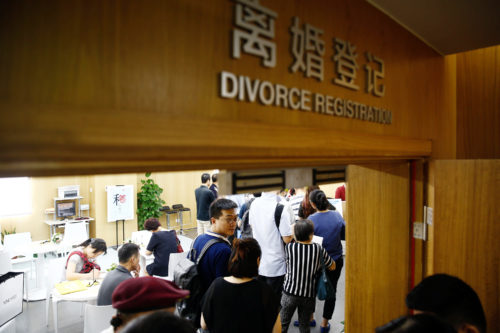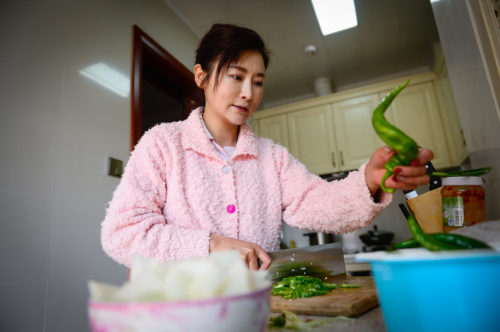The internet rejoices: Chinese actress celebrates romantic holiday by announcing divorce from terrible husband
It was a strange “I love you” day for one celebrity couple — fans of an actress rejoiced at news of her divorce, but censors stepped in to stop the congratulations.

On Chinese social media, May 20 is a romantic holiday a little like Valentine’s Day because “5•20” (五二零 wǔ èr líng) sounds a little like “I love you” (我爱你 wǒ ài nǐ) in Mandarin. This May 20, however, Chinese actress Tóng Lìyà 佟丽娅 and her husband, director and producer Chén Sīchéng 陈思诚, announced their divorce.
On Thursday, Tong, 36, revealed that she had split from Chen, by sharing a Weibo post (in Chinese) that tagged him. “I had a worthwhile time and am looking forward to the future. Thank you,” she wrote.
Almost simultaneously, Chen, 43, said on Weibo that despite their marriage coming to an end, he still had a lot of love for Tong. “I will take on a new role in your life and still care for you,” he wrote. The post was coupled with a throwback pic of Tong and their five-year-old son happily snuggling up on a couch.
It’s unclear why the couple — out of all the days of the year — chose May 20 to tell everyone about their breakup. Adding to the weirdness of the situation, the vast majority of Chinese internet reactions to the news were positive and supportive, with people congratulating Tong on her divorce.
“Finally! You are freed from an awful marriage,” an internet user wrote (in Chinese) on Tong’s Weibo page. Another person commented (in Chinese), “Congratulations on being single again. I knew he wasn’t the right person for you since the very beginning. He didn’t deserve you!”
Tong and Chen’s relationship was plagued by rumors of cheating, controversies over Chen’s misogyny and narcissism, and other predictable problems of celebrity couples. In 2010, the two first met on the set of Beijing Love Story, a hit TV drama co-scripted and directed by Chen. Two years later, the couple made their relationship public and then tied the knot. Not long after, photos circulated on the internet that apparently showed Chen flirting with a mystery woman. At that time, Chen denied cheating allegations, and Tong came to his defense, insisting that she was confident about their relationship.
But after their son was born in 2016, rumors once again surfaced of Chen’s infidelity. This time, instead of speaking publicly on the matter, Tong posted a photo of her and her son on WeChat, with a caption reading, “A new start.” Since then, although the pair continued to flaunt their love on social media, rumors circulated about a possible separation. Meanwhile, Chen has been called out multiple times for his objectification of women and sexist remarks. In one instance, when asked at a press conference why he cast Tong in one of his films, Chen said it’s because Tong, as an actress, was “cheap but high-quality eye candy.”
To many observers, Tong’s decision to call it quits was “long overdue.” After the news of her divorce broke, several hashtags about the news immediately started trending on Weibo. But then, later yesterday, some of the most popular hashtags, including “Chen Sicheng and Tong Liya divorcing” (陈思诚佟丽娅离婚), turned out to be unsearchable, and the news was mysteriously removed from the platform’s trending topics list despite being the most talked-about subject of the day.
So far, there has been no official explanation given by Weibo for the censorship. Speculation has emerged that Chen pulled some strings to clamp down on the discussion because the outpouring of congratulatory messages directed at Tong made him look bad. Others believed that the block was a purposeful strike by Chinese censors, who perhaps figured that social media users celebrating the death of a high-profile marriage on May 20 was at odds with traditional views of romance held by the Chinese government.
While this guess seems far-fetched on the surface, it’s not entirely without merit. Earlier this week, several marriage registration offices across China announced that they would suspend divorce registrations on May 20, but later reversed course after an online uproar. Their attempts to curb couples’ separations are apparently part of a nationwide campaign to reduce the country’s rising divorce rate. A key component in this government-led initiative was the introduction of a new divorce law, which came into effect this January and requires couples to take part in a 30-day “cooling-off” period before officially calling it quits.






